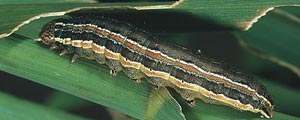
REGIONAL crop specialists have agreed to collaborate in the fight to eradicate armyworm which normally destroys cereal crops between December and March each year.
PAIDAMOYO MUZULU SENIOR REPORTER
The calls to strengthen ties among Sadc member states was made at a Capacity Development for Community-based Armyworm Forecasting on Southern Africa workshop held in Harare yesterday.
Crop specialists from Botswana, South Africa, Mozambique, Malawi, Namibia, Swaziland and Zimbabwe attended the workshop which was organised by the Food and Agriculture Organisation (FAO).
Winfred Hammond, a senior entomologist with FAO, told delegates that armyworm and other transboundary pests could have a devastating effect on the region’s food security if left unchecked.
“It is important the region develops an early warning system against threats, facilitate and organise joint technical assistance on armyworm in the region,” Hammond said.
Zimbabwe, with support from the European Union, has trained some 175 extension workers to capacitate farmers and communities with skills to detect armyworm outbreaks.
The country currently has 88 traps annually with the majority sited in Mashonaland Central and East provinces.
- Chamisa under fire over US$120K donation
- Mavhunga puts DeMbare into Chibuku quarterfinals
- Pension funds bet on Cabora Bassa oilfields
- Councils defy govt fire tender directive
Keep Reading
The monitoring programme has, however, been hampered by shortage of vehicles for monitors, with only one vehicle available to cover all the 10 provinces. Zimbabwe last year experienced mild armyworm attacks at Lupane and Burma Valley, while Malawi, Mozambique, Namibia and Lesotho experienced mild to severe attacks.
Armyworm attacks can at times wipe out the entire crop, severely deplete pastures and at the same time compromise food security in the region.
Almost all of the Sadc countries are failing to pay their $100 000 annual subscriptions to join the regional early warning system.
Environment and climate change, Hammond said, was also contributing to the severity and frequency of transboundary pests such as armyworm and qualia birds.











